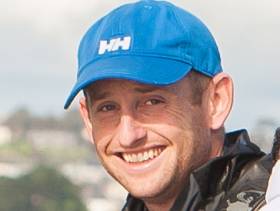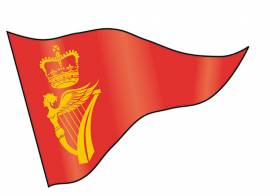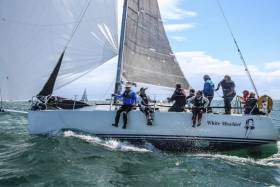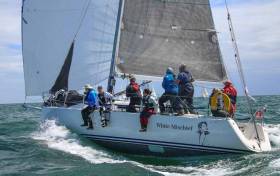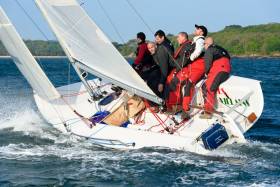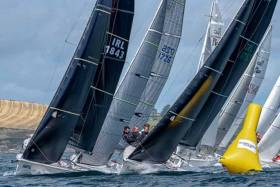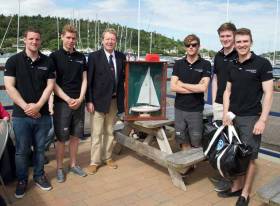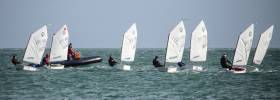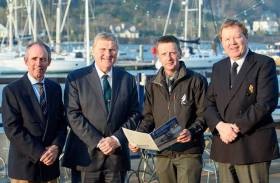Displaying items by tag: RCYC
Royal Cork Dinghy Fest Attracts Multiple Championships for Weekend of Centreboard Action
Cork Harbour's own Alex Barry will be out to retain his southern title in the RS400 class as part of Royal Cork's Dinghyfest that starts tomorrow. It's one of a number of championships being staged as part of the Crosshaven initiative to foster dinghy sailing.
Barry, the current holder of the ISA's All Ireland Sailing title is also a keen National 18 sailor but campaigning his RS400 takes priority this weekend. The passionate centreboard sailor has spoken previously to Afloat.ie about plans to keep dinghy sailing alive. 'Friendships Through RS Sailing is the key to future of dinghy classes', the All Ireland Champ told Afloat.
Running as part of the weekend – that looks certain to attract over 100 boats – is the RS 200 Euro Cup & Irish National Championships, the National 18 National Championships, the RS Feva and RS 400 Southern Championships plus a PY fleet and an Optimist fun Fleet.
In the RS400, Ballyholme's Gareth Flanigan leads the challengers with Baltimore's top Laser sailor Fionn Lyden also entered in the double–hander.
There will be four course areas with two inside Roche’s Point at Cuskinny and the Curlane Banks while two more course areas will be in the outer harbour between Roche’s Point and Power Head.
The RS200 and the larger RS400 will sail together while the International 420s and the National 18s will be in the same group on an outer courses. The Irish 420 fleet is buoyed up by some international results scored last week at Kiel Regatta, Germany.
Prizes are provided by event sponsors CH Marine and their Zyck range of sailing gear.
Racing gets underway on Friday for the start of the national championships in the RS200 and 420 classes while the total DinghyFest will be afloat over the weekend including the foiling Moth class from 2.30pm on Saturday where John Chambers is also expected to debut his Waszp dinghy too.
Govt Dept Doesn't Recognise RCYC As ‘Oldest in the World’
Apparently someone in the Department of the Marine doesn’t accept that the Royal Cork Yacht Club at Crosshaven is correct when the club says it is “the oldest in the world...” writes Tom MacSweeney.
On behalf of Marine Minister Michael Creed the Department issued a press release today congratulating Cork on being chosen as the city to host European Maritime Day in 2020. The press release said: “European Maritime Day 2020 will also coincide with the 300 year anniversary of the Royal Cork Yacht Club (RCYC), one of the oldest yacht clubs in the world.”
The RCYC has always stated itself to be “the oldest yacht club in the world.....” The club describes itself as: “The Royal Cork Yacht Club is based in Crosshaven, Cork, Ireland and is the world's oldest yacht club founded in 1720.”
Cork City Council repeated the Department statement in its press release. A few years ago at the opening of Sea Fest in the National Maritime College in Ringaskiddy a Junior Minister used the same Department description of the RCYC. Seems somebody up there in Dublin doesn’t appreciate the RCYC!!! My information is that it the Department disputes the RCYC claim and references the Neva Yacht Club in St Petersburg!!!! Whatever about the Department, does Cork City Council take the same view, I wonder?
The Neva Yacht Club, is a sailing club located in Saint Petersburg, close to the Neva River. Wikipedia says it that was founded in 1718, and was re-established as a club in 1958. There is no evident claim to this on its own club website. Could Putin have his eye on the RCYC’s claim?
Tom MacSweeney is a member of RCYC
ICRA National Championships 2017: Runners & Riders
Class bands released for next week's ICRA National Championship (see below) reveal a smaller than usual fleet for the Royal Cork Yacht Club Championships but with three events in three weeks all trying to attract boats out of Dublin where 90% of boats are based, it was always going to be a tough nut to crack. Championship fleet sizes will range from four boats in Class Zero to fourteen in Class Four where there will be some great battles for national honours starting next Thursday in Crosshaven. With early forecasts showing strong south-westerly winds prevailing, Afloat.ie sticks its neck out in a 'Runners and Riders' Guide to the 2017 Cork Harbour Championships.
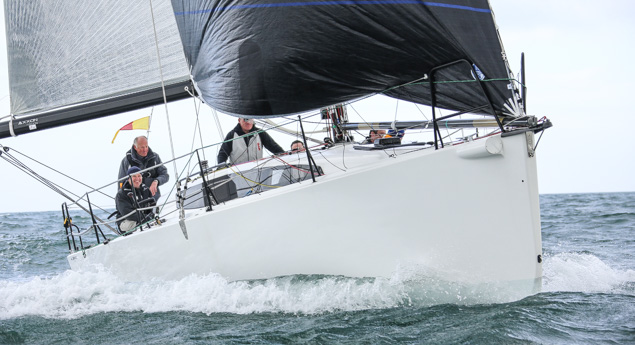 The ISORA front runner Rockabill VI, the JPK 10.80 is from the Royal Irish Yacht Club Photo: Afloat.ie
The ISORA front runner Rockabill VI, the JPK 10.80 is from the Royal Irish Yacht Club Photo: Afloat.ie
Class 0 There are just four boats in Class Zero and two are travellers to Cork Harbour. The Dubois 37, Dark Angel, ex–Antix, with Rob O'Leary onboard, won at Cork Week last year beating local favourite Jump Juice (Ker 37) for the top spot, so this pair are likely to produce another close battle next week. If winds are strong, a previous Round Ireland winner, Inis Mor, a Ker 39, will be a force to be reckoned with. [See update: Inis Mor sinks on way to championships –Ed.] The fourth boat entered is a Salona 45, Meridian. With half of the Zero fleet travelling to Cork for the event, the hope is the strong south–westerlies won't deter.
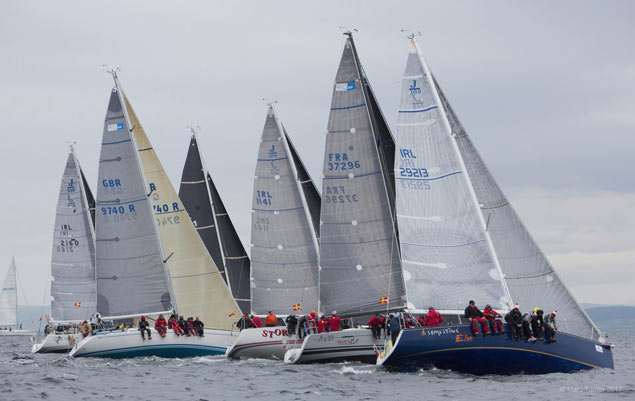 Pat Kelly's J109 Storm has already won in Scotland (above) this season and is race–ready for the ICRA Nationals. Photo: Marc Turner Class 1 Only the four top J109’s from the 2016 ICRAs are turning up in Cork for this nine–boat class. Joker II, Storm, White Mischief and Jigamaree. The new Dublin Bay J109’s of Andrew Craig and Andrew Algeo are not entered. Algeo's Juggerknot is opting for the D2D and Sovereigns but not ICRAs. The JPK10.80 Rockabill VI (Paul O'Higgins) from the Royal Irish Yacht Club has already shown his potency offshore this season in the ISORA series, pundits say she will be strong in Cork too if all three days are sailed in strong winds, but one light day may prove her undoing. ICRA Boat of the Year, John Maybury's Joker II is going for three–in–a–row of ICRA wins, with Star keelboat Olympian Mark Mansfield as Tactician. Pat Kelly's Storm, fresh from a class win at last month's Scottish Series will certainly be in the mix. The Rush Sailing Club boat has now changed to symmetrical spinnakers which will give her an edge if winds are stronger. Kelly was afloat early this year and competing in the Spring Warmer in Howth and then HYC Wednesday nights. It means this team is race–ready as they have already proved in Scotland. Whether or not the new kite is paying dividends has not been disclosed. A tight–lipped Ronan Kelly told Afloat.ie: 'We can't really give that much feedback as it is very much in the early stages of trial for us'. The IRC rating is slightly higher than Storm had prior to the change in spinnakers. And the decision to change, says Ronan Kelly, was based on the notion of 'why not try something different out?'
Pat Kelly's J109 Storm has already won in Scotland (above) this season and is race–ready for the ICRA Nationals. Photo: Marc Turner Class 1 Only the four top J109’s from the 2016 ICRAs are turning up in Cork for this nine–boat class. Joker II, Storm, White Mischief and Jigamaree. The new Dublin Bay J109’s of Andrew Craig and Andrew Algeo are not entered. Algeo's Juggerknot is opting for the D2D and Sovereigns but not ICRAs. The JPK10.80 Rockabill VI (Paul O'Higgins) from the Royal Irish Yacht Club has already shown his potency offshore this season in the ISORA series, pundits say she will be strong in Cork too if all three days are sailed in strong winds, but one light day may prove her undoing. ICRA Boat of the Year, John Maybury's Joker II is going for three–in–a–row of ICRA wins, with Star keelboat Olympian Mark Mansfield as Tactician. Pat Kelly's Storm, fresh from a class win at last month's Scottish Series will certainly be in the mix. The Rush Sailing Club boat has now changed to symmetrical spinnakers which will give her an edge if winds are stronger. Kelly was afloat early this year and competing in the Spring Warmer in Howth and then HYC Wednesday nights. It means this team is race–ready as they have already proved in Scotland. Whether or not the new kite is paying dividends has not been disclosed. A tight–lipped Ronan Kelly told Afloat.ie: 'We can't really give that much feedback as it is very much in the early stages of trial for us'. The IRC rating is slightly higher than Storm had prior to the change in spinnakers. And the decision to change, says Ronan Kelly, was based on the notion of 'why not try something different out?'
Tim Goodbody's J109 White Mischief is also very likely to be in the mix. Rob McConnell's A35 Fools Gold (second in Scotland last month) will be competitive, especially in stronger winds and former winner in ICRA Tralee 2013, the Xp–33 Bon Exemple (Colin Byrne of the Royal Irish) is also expected to be there or thereabouts. This will be a very competitive class, and wind conditions will likely make a big difference with Joker II the favourite in the mixed conditions but if it is strong on all three days, Rockabill VI is a likely winner.
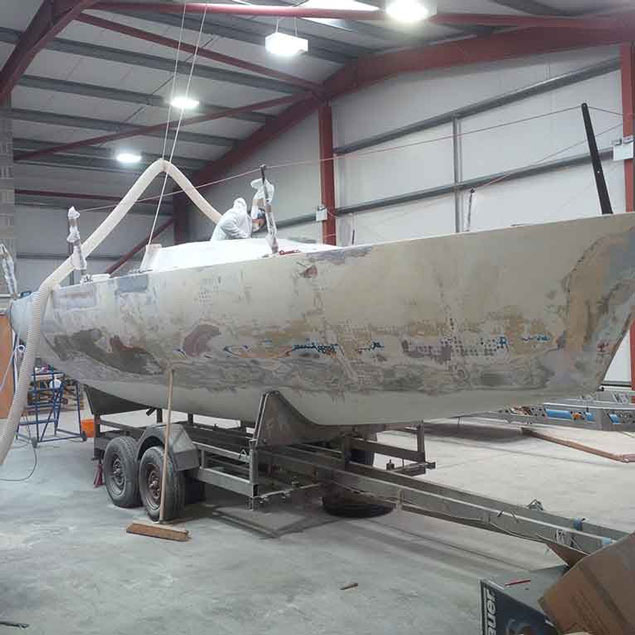 Checkmate XVIII – the old Emiliano Zapata, ex Dick Dastardly, ex French Beret, ex Concorde from 1985 is undergoing a refit in North Wales and hopes to be at the ICRA Nationals in Cork Class 2 Normally, the Half tonners would be favourites in this 12-boat class and any one of Checkmate, Harmony or Big Picture could take it, especially if the conditions are mixed or lighter. Nigel Biggs new Checkmate XVII is entered and this is an unknown factor as is his appearance at all. 'We are putting long hours in at the moment but it's very touch and go. Fingers crossed...' he told Afloat.ie. If conditions are strong expect to see Ross McDonald's X-332 Equinox from Howth to be a dominant player, as she was at the 2015 ICRAs in Kinsale when she won easily in stronger winds. Paul Tingle's X34 Alpaca, as top–rated boat in this class, also could be a wild card.
Checkmate XVIII – the old Emiliano Zapata, ex Dick Dastardly, ex French Beret, ex Concorde from 1985 is undergoing a refit in North Wales and hopes to be at the ICRA Nationals in Cork Class 2 Normally, the Half tonners would be favourites in this 12-boat class and any one of Checkmate, Harmony or Big Picture could take it, especially if the conditions are mixed or lighter. Nigel Biggs new Checkmate XVII is entered and this is an unknown factor as is his appearance at all. 'We are putting long hours in at the moment but it's very touch and go. Fingers crossed...' he told Afloat.ie. If conditions are strong expect to see Ross McDonald's X-332 Equinox from Howth to be a dominant player, as she was at the 2015 ICRAs in Kinsale when she won easily in stronger winds. Paul Tingle's X34 Alpaca, as top–rated boat in this class, also could be a wild card.
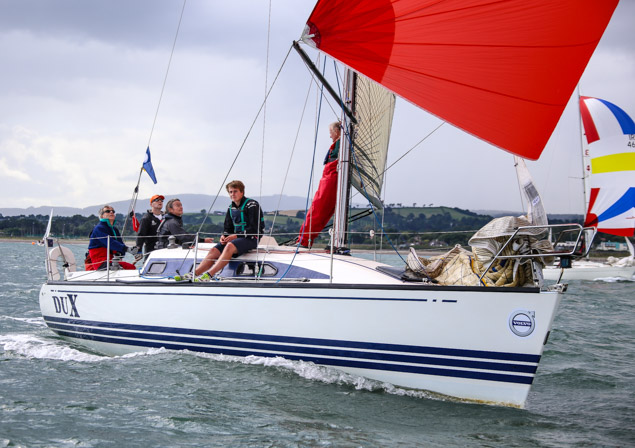 Stronger conditions may suit X302s like Dux from Howth Yacht Club Photo: Afloat.ie
Stronger conditions may suit X302s like Dux from Howth Yacht Club Photo: Afloat.ie
Class 3 The quarter tonners, like the half tonners in class 2 are bottom of this the second biggest class of the ICRA championships with 13 entered. If conditions are light or mixed, expect Paul Gibbons Anchor Challenge to be strong. She has Olympian Kiliian Collins onboard and they will give Ken Lawless’s Cartoon, 2016 ICRA winner, a tough challenge. If conditions are stronger then the Corby 25’s Fusion and Stonehaven racing will be up there as will the two X302’s, Dux and Maximus. The Sigma 33’s could also prove competitive in the breeze. In a mixed event, however, the money would be on Anchor Challenge to take it.
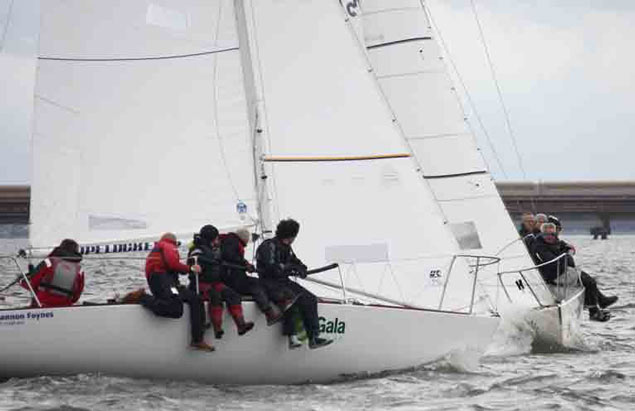 Close racing for the 16–boat J24 fleet at Foynes Yacht Club, ten J24s including Gala Racing (above) will be in Cork
Close racing for the 16–boat J24 fleet at Foynes Yacht Club, ten J24s including Gala Racing (above) will be in Cork
Class 4 There are 10 J24’s in this class of 14, the event's biggest fleet, and the winner will very likely come from one of them. Corkman, Flor O'Driscoll, with his local knowledge, should be up there on Hard on Port. However, this is a close class and hard to call.
ICRA Nationals 2017 – Class Divisions (as at June 2, 2017). Data supplied by ICRA
| DIVISION | BOAT NAME | TYPE |
|---|---|---|
| 0 | Inis Mor | Kerr 39 |
| 0 | Meridian | Salona 45 |
| 0 | Jump Juice | Ker 37 |
| 0 | Dark Angel | Dubois 37 |
| 1 | Rockabill VI | JPK 10.80 |
| 1 | Saxon Senator | X37 |
| 1 | Fools Gold | A35 |
| 1 | Altair | First 36.7 |
| 1 | Storm | J109 |
| 1 | Joker 2 | J109 |
| 1 | Jigamaree | J109 |
| 1 | White Mischief | J109 |
| 1 | Bon Exemple | XP33 |
| 2 | Alpaca | X-34 |
| 2 | Ellida | X-332 |
| 2 | Equinox | X-332 |
| 2 | Coracle IV | Olson 30 |
| 2 | Jostler | J92 |
| 2 | Jedi | J80 |
| 2 | Rioja | J80 |
| 2 | Artful Dodger | Elan 333 |
| 2 | Slack Alice | GK34 |
| 2 | Harmony | 1/2 Tonner |
| 2 | Checkmate XV | Mod 1/2 Ton |
| 2 | Checkmate XVII | Mod 1/2 Ton |
| 3 | Fusion | Corby 25 |
| 3 | Bad Company | Sunfast 32 |
| 3 | Stonehaven Racing | Corby 25 |
| 3 | Maximus | X-302 |
| 3 | Dux | X-302 |
| 3 | Luas | HB31 |
| 3 | Sea Hawk | Sigma 33 |
| 3 | Flyover | Sigma 33 00D |
| 3 | Cri-Cri | 1/4 ton |
| 3 | Powder Monkey | Sigma 33 |
| 3 | No Gnomes | Nicholson 30 |
| 3 | Cartoon | 1/4 ton |
| 3 | Manzanita | 1/4 ton |
| 4 | Jade | J24 |
| 4 | K25 Team Scandal | J24 |
| 4 | Jumpin' Jive | J24 |
| 4 | Hard on Port | J24 |
| 4 | Stouche | J24 |
| 4 | Johnny Bravo | J24 |
| 4 | Jana | J24 |
| 4 | Gala Racing | J24 |
| 4 | Ya Gotta Wanna | J24 |
| 4 | Jelignite | J24 |
| 4 | Bandit | Mod Bolero 26' |
| 4 | Relativity | Albin Express |
| 4 | Whistlin Dixie | Impala 28 |
| 4 | Raffles | Sadler32 |
| Non Spin | Rebellion | Lambay 60 |
| Non Spin | Nieulargo | Grand Soleil 40 |
| Non Spin | Indulgence | Dehler 365 |
| Non Spin | Aisling | Dufour 365 |
| Non Spin | Sweet Dreams | Sun Odyssey 36 |
| Non Spin | Surfdancer | Elan 333 |
| Non Spin | Roaring Forthyes | Beneteau 35s5 |
| Non Spin | Privateer | Dufour 365 |
| Non Spin | Lady T | Sun Odyssey 32i |
| Non Spin | Loch Greine | Hanse 31 |
| Non Spin | Aramis | Contessa 33 |
| Non Spin | Cracker | Trapper T250 |
| Non Spin | Speedy Gonzales | Jaguar 27 |
With a month to go to the ICRA National Championships at Royal Cork Yacht Club, the Cruiser Racer body has published a 56–boat entry list to date that reveals a large entry from the host Cork Harbour Club. Royal Cork yachts represent 30% of entries received to date. Dublin Boats represent another 30% but there is likely to be some disappointment that no entries have so far been received from either the Royal St. George YC or National Yacht Clubs. To date, Howth Yacht Club is sending eight boats while the Royal Irish Yacht Club is sending similar.
18 yacht clubs are represented at the 2017 championships.
Neighbouring Kinsale Yacht Club has five entries listed. A single Scottish entry from the Clyde has been received as has a single Welsh entry from Swansea Yacht Club.
Seven boats in the fleet are J24 one designs that will also race for southern class honours, a new departure for the ICRA championships.
ICRA believes only 60% of the entries have been recevied at this stage so with five days before the early bird entry expires, ICRA Commodore Simon McGibney is urging skippers to avail of the discounted rate.
Read the provisional ICRA entry list below:
| BOAT NAME | TYPE | IRC HANDICAP | SAIL NUMBER | CLUB |
| Powder Monkey | Sigma 33 | 0.912 | IRL 4206 | Tralee |
| Rioja | J80 | 0.953 | GBR 380 | Royal Cork |
| Ellida | X332 | 0.981 | IRL 6021 | Royal Cork |
| Raptor | Mills 30CR | 1.013 | IRL 811 | Royal Irish |
| Bandit | Mod Bolero 26' | 0.881 | IRL 2622 | Royal Cork |
| Bonanza | Impala 28 | 0.888 | IRL 9515 | Royal Cork |
| Sea Hawk | Sigma 33 | 0.914 | IRL 4506 | Royal Cork |
| Jump Juice | Ker 37 | 1.109 | IRL 2007 | Royal Cork |
| Rebellion | Lambay 60 | 1.056 | IRL 6001 | Wicklow SC |
| Gala Racing | J24 | 0.884 | IRL 4384 | Foynes SC |
| Joker 2 | J109 | 1.015 | IRL 1206 | Royal Irish |
| Fusion | Corby 25 | 0.934 | IRL 2552 | Howth YC |
| Altair | First 36.7 | 1.016 | IRL 3670 | Cobh / Royal Cork |
| Bad Company | Sunfast 32 | 0.934 | IRL 16859 | Royal Cork |
| Dark Angel | Dubois 37 | 1.096 | GBR 8833R | Swansea YC |
| Objection | Sun Odyssey 35 | 0.942 | IRL 4004 | Kinsale YC |
| Artful Dodger | Elan333 | 0.952 | IRL 1333 | Kinsale YC |
| Alpaca | X34 | 0.995 | IRL 35221 | Royal Cork |
| K25 Team Scandal | J24 | 0.886 | 4212 | Howth YC |
| Checkmate XVII | Mod 1/2 Tonner | 0.944 | IRL 2016 | Howth YC |
| Loch Greine | Hanse 31 | 0.923 | IRL 1033 | Royal Cork |
| Surfdancer | Elan 333 | 0.970 | IRL 1759 | Royal Cork |
| Stonehaven Racing | Corby 25 | 0.934 | GBR 6655 | Royal Western YC |
| Privateer | Dufour 365 | 0.940 | IRL 3653 | Kinsale YC |
| Raffles | Sadler32 | 0.865 | GBR 6095T | Schull HSC |
| Cartoon | 1/4 ton | 0.895 | IRL 9186 | Royal Irish YC |
| Inis Mor | Kert 39 | 1.118 | FRA 35439 | CCC Scotland |
| Bon Exemple | XP33 | 1.009 | GBR 8933R | Royal Irish YC |
| Saxon Senator | X37 | 1.035 | IRL 1447 | Royal Cork YC |
| Jumpin' Jiv | J24 | 0.886 | IRL 3060 | Greystones SC |
| Dux | X302 | 0.927 | IRL 988 | Howth YC |
| Jostler | J92 | 0.970 | IRL 1078 | Kinsale YC |
| Storm | J109 | 1.016 | IRL 1141 | Rush/Howth |
| Relativity | Albin Express | 0.877 | IRL 262 | Cobh SC |
| Harmony | 1/2 Tonner | 0.946 | IRL 1484 | Howth YC |
| Aramis | Contessa 33 | 0.920 | IRL 1022 | Royal Cork |
| Jana | J24 | 0.885 | 397 | Sligo YC |
| Bene Bebe | First 210 | 0.840 | GBR 7712T | Royal Cork |
| Stouche | J24 | 0.886 | IRL 4215 | Foynes SC |
| Equinox | X-332 | 0.979 | IRL 1332 | Howth YC |
| Indulgence | Dehler 365 | 0.996 | IRL 2805 | Royal Cork |
| Jade | J24 | 0.887 | IRL 4094 | NMCISC Maritime College |
| Slack Alice | GK34 | 0.949 | IRL 4170 | Waterford HSC |
| Johnny Bravo | J24 | 0.885 | 4115 | Howth YC |
| Cri-Cri | 1/4 ton | 0.912 | 18709 | Royal Irish YC |
| Rockabill VI | JPK 10.80 | 1.051 | IRL 10800 | Royal Irish YC |
| Manzanita | 1/4 ton | 0.889 | IRL 2076 | Schull HSC |
| White Mischief | J109 | 1.010 | GBR 1242R | Royal Irish YC |
| Aisling | Dufour 365 | 0.985 | IRL 3651 | Royal Cork YC |
| Sweet Dreams | Jenneau 36 | 0.985 | IRL 3612 | Royal Cork YC |
| Whistlin Dixie | Impala 28 | 0.876 | IRL 9516 | Royal Cork YC |
| Lady T | Sun Odyssey 32i | 0.932 | IRL 2510 | Royal Cork YC |
| Jigamaree | J109 | 1.011 | IRL 7991 | Royal Irish YC |
| Meridian | Salona 45 | 1.112 | IRL 4076 | Kinsale YC |
| Fools Gold | A35 | 1.022 | IRL 3061 | Waterford HSC |
| Maximus | X-302 | 0.930 | IRL 7495 | Howth YC |
Royal Cork's UK Sailmakers May League Photo Gallery
Royal Cork Yacht Club's UK Sailmakers May league began this evening and Afloat.ie's Bob Bateman captured the sailing action from Cork Harbour.
In the first race of a seven boat 1720 division Heroes and Villains (Gary Rhodes) was the winner. Brian Twomey was second in RCYC 1 and third Brian Jones's Cosmic
ICRA Sponsor Offers 'Free Model Truck' As Entry Incentive for Royal Cork National Championships
As ICRA ramps up its promotion for the Cruiser–Racer National Championships at Royal Cork Yacht Club in June, fleet sponsor WD40 is offering a free 'collectors item' model truck to the next six entries received.
The RCYC entry list is certainly hotting up. 2016 ICRA National Class Champions Jump Juice, Joker II, Checkmate XVII and Cartoon will all be back defending their national titles in Crosshaven in June.
Red more about how the coming season is shaping up in Class zero and one here and class two here.
Enter online for the ICRA Nats here.
Sailing with Dutch sail numbers Anthony O'Leary has won all six races of the Sportsboats April League at Royal Cork Yacht Club writes Bob Bateman.
Sailing a 1720, the former Afloat Sailor of the Year leads Cork Harbour club–mates Clive O' Shea and Tom Durcan in another of the Royal Cork's own 1720 designs.
Third in the seven–boat fleet is a J80, Rioja, sailed by Ernie Dillon and Dominic Baxter. Full results downloadable below.
ICRA Nationals Bring J/24 Southerns into the Mix
This year the J/24 Southern Championships will return to Cork Harbour for the third consecutive year with the added incentive to participate as the ‘Southerns’ will run in conjunction with the ICRA Nationals at the Royal Cork Yacht Club.
This will extend the championship from a two day to three day event and racing under the ICRA banner means National Titles are also up for grabs in both IRC and ECHO, within the division. The Frank Heath Trophy will be presented to the winners of the Southern Championship, based on results extracted from IRC.
In close collaboration with other clubs RCYC have agreed with Foynes Yacht Club that boats participating in the J/24 Western Championships at the end of May will be able to leave their boats at the Foynes club until the ICRA Nationals just a few weeks later. While in the area, there is an option to do a third event, with Sovereign’s Cup taking place in Kinsale at the end of June, and again free storage between events.
The J/24’s have been seeing something of a revival in recent years and it’s hard not to see the allure. A boat that can be trailer sailed and needs a crew of just five eliminates many of the headaches of owners of bigger boats. The J/24's are often described as ‘tweaky’ boats which take a bit of getting used to but for the sailors who want to improve their racing skills and understanding of rig tuning, weight displacement etc. these are a brilliant and very affordable option. As with any one design fleet, racing is highly competitive and mistakes can be costly in relation to results but that’s part of the fun, a real measure of sailing skills!
There is also a fantastic social side to the après sailing. Under the leadership of the Irish J/24 Class Association President Flor O’Driscoll you will find an extremely welcoming association with the more experienced J/24 sailors happy to share their knowledge over a pint at the bar. There will be entertainment at the Royal Cork Yacht Club after sailing each evening with BBQ or sit down dinner options available, so plenty of opportunity to analyse the days racing and pick the brains of fellow sailors. Running alongside a major national event will surely augment the craic and can only make for a better weekend of sailing!
The Carrigaline Court Hotel are offering a fantastic deal with a Room Only Rate (per night) of Single €85.00, Double/Twin €99.00, Triple €109.00. Bed and breakfast and evening meal options also available. Please quote ‘IRC National Championships’ when booking.
The early bird entry fee of €150 is still available. ICRA and RCYC would ask all competitors to book as soon as possible to facilitate better planning of the event.
Five Irish Optimist sailors were in the top five of the UK's Spring Championships last weekend. IOCA UK and The Royal Torbay Yacht Club hosted IOCA UK's first championship of the year in Torquay.
119 sailors competed in the main fleet over the two days, including a team of 24 sailors from Ireland. The sailing conditions were deemed "exceptionally tricky", with gusts of over 25 knots and waves of up to two metres.
Overall winner was Jamie Cook of Cardiff Bay Yacht Club, winning five out of the six races, followed by Finley Dickinson in 2nd place and William Pank in 3rd place. Top girl was India Page-Wood in 5th place. First Junior was Luke Turvey from Ireland, who finished a respectable 20th overall.
Top Irish boat was Justin Lucas of Royal Cork in eigth place and his clubmate Killian O'Regan was ninth. Full results are here.
Jamie Cook said: "It's nice to do more events on the sea in a great venue like Torbay and the conditions were awesome. I think that the sea is the best place to sail. It was a good weekend and hope to sail there again soon."
29 regatta fleet sailors completed 10 races over the weekend with Noah Evans from Royal Victoria Yacht Club finishing in 1st place.
IOCA's Claire Mueller added: "A special mention must also be made of Michael Crosbie from Royal Cork Yacht Club, who finished in 15th place and was competing in his first major competition since breaking both legs last year. Well done Michael." In recognition of this achievement Michael received a sailing watch from one of IOCA UK's class sponsors IBI Sailing.
2017 is a special year for IOCA UK, as it has recently been announced it will host a Champion of Champions Race at its 2017 British Nationals in celebration of 70 years of the Optimist Dinghy. To be held at the Weymouth and Portland National Sailing Academy, those battling it out for the ultimate glory will be past National Optimist Champions, Olympic sailors, Optimist coaches and the top current sailors.
ICRA Nationals Launched in Royal Cork Yacht Club
A full programme of races for nine national titles at this year's ICRA National Championships was launched this week at the Royal Cork Yacht Club by Minister Simon Coveney.
Admiral John Roche and ICRA Chairman Simon McGibney were also present as was newly elected ISA President Jack Roy. The national event will be held in the Crosshaven club from Friday June 9th to Sunday June 11th and will be officiated by international race officers Jack Roy, Alan Crosbie and Peter Crowley.
Minister Coveney spoke of his delight in seeing Crosshaven and Kinsale (Sovereigns Cup) hosting major sailing events this summer and he wished both clubs every success. He encouraged all sailors to partake in the regattas and keep the sport at the forefront of the international sailing calendar which in turn will bring visitors from overseas and other Irish ports to the local area.
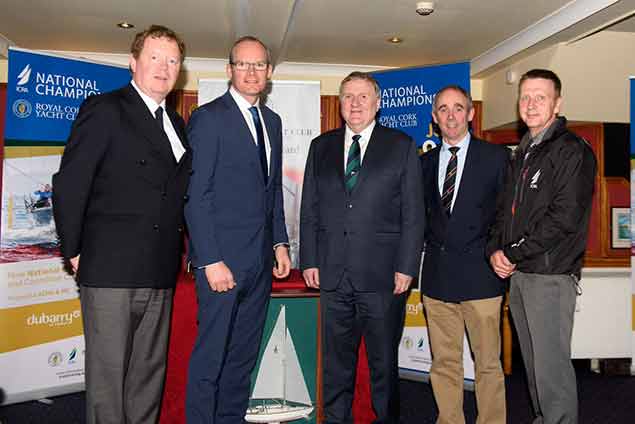 ICRA Champs launched – Royal Cork Admiral John Roche with Minister Coveney, ISA President Jack Roy, Event Chairman Paul Tingle and ICRA Commodore Simon McGibney. Photo: Bob Bateman
ICRA Champs launched – Royal Cork Admiral John Roche with Minister Coveney, ISA President Jack Roy, Event Chairman Paul Tingle and ICRA Commodore Simon McGibney. Photo: Bob Bateman
Royal Cork Admiral John Roche thanked event chairman Paul Tingle and his committee for running the event on behalf of the club and wished them every support and success.
Entry to the ICRA National Championships is now available on-line (royalcork.com and cruiserracing.ie) with a very reasonable entry fee of €150 per boat.



























